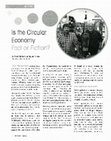Papers by Meghan Robinson

The so-called “three Rs” – reduce, reuse, and recycle – have been the alleged holy grail of progr... more The so-called “three Rs” – reduce, reuse, and recycle – have been the alleged holy grail of progressive waste experts, consultants and the environmental movement for three decades. They are three different aspect of waste management policies, habits and practices that are intended to work in tandem to achieve common goals: to increase efficiency, to reduce our need to harvest natural resources by getting a greater use out of what we already have, and to build a more sustainable society.
In late June 2016, the Ontario enacted Bill 155, the Waste Free Ontario Act (WFOA) after years of intense debate about waste management policy in Ontario. The Waste Free Ontario Act seeks to place a greater emphasis on the principles of the three Rs, with the goal of eventually creating a circular economy and supposedly sending zero net waste to landfills. These are lofty goals, to be sure, and while they are not insurmountable, there will be colossal hurdles along the way.
The three Rs have long been held up as an ideal, but in practice, their implementation has been spotty at best. Traditionally, while reduce, reuse, and recycle are always spoken in the same breath, the vast majority of effort and attention has been paid to recycling. This is a problem because recycling is arguably the least valuable of the three Rs. More fundamentally, the emphasis on 3Rs has steered policymakers away from a larger public policy debate
Recycling certainly has a place and a value, but it cannot be the only solution. By comparison, the concept of reusing items over and again to increase their lifespan has been perhaps the most neglected of the “Rs.” It requires the biggest change in how we think and behave. It requires an end to our throwaway mentality, and a willingness to repair and maintain items rather than constantly buying new ones as a matter of course.






Uploads
Papers by Meghan Robinson
In late June 2016, the Ontario enacted Bill 155, the Waste Free Ontario Act (WFOA) after years of intense debate about waste management policy in Ontario. The Waste Free Ontario Act seeks to place a greater emphasis on the principles of the three Rs, with the goal of eventually creating a circular economy and supposedly sending zero net waste to landfills. These are lofty goals, to be sure, and while they are not insurmountable, there will be colossal hurdles along the way.
The three Rs have long been held up as an ideal, but in practice, their implementation has been spotty at best. Traditionally, while reduce, reuse, and recycle are always spoken in the same breath, the vast majority of effort and attention has been paid to recycling. This is a problem because recycling is arguably the least valuable of the three Rs. More fundamentally, the emphasis on 3Rs has steered policymakers away from a larger public policy debate
Recycling certainly has a place and a value, but it cannot be the only solution. By comparison, the concept of reusing items over and again to increase their lifespan has been perhaps the most neglected of the “Rs.” It requires the biggest change in how we think and behave. It requires an end to our throwaway mentality, and a willingness to repair and maintain items rather than constantly buying new ones as a matter of course.
In late June 2016, the Ontario enacted Bill 155, the Waste Free Ontario Act (WFOA) after years of intense debate about waste management policy in Ontario. The Waste Free Ontario Act seeks to place a greater emphasis on the principles of the three Rs, with the goal of eventually creating a circular economy and supposedly sending zero net waste to landfills. These are lofty goals, to be sure, and while they are not insurmountable, there will be colossal hurdles along the way.
The three Rs have long been held up as an ideal, but in practice, their implementation has been spotty at best. Traditionally, while reduce, reuse, and recycle are always spoken in the same breath, the vast majority of effort and attention has been paid to recycling. This is a problem because recycling is arguably the least valuable of the three Rs. More fundamentally, the emphasis on 3Rs has steered policymakers away from a larger public policy debate
Recycling certainly has a place and a value, but it cannot be the only solution. By comparison, the concept of reusing items over and again to increase their lifespan has been perhaps the most neglected of the “Rs.” It requires the biggest change in how we think and behave. It requires an end to our throwaway mentality, and a willingness to repair and maintain items rather than constantly buying new ones as a matter of course.